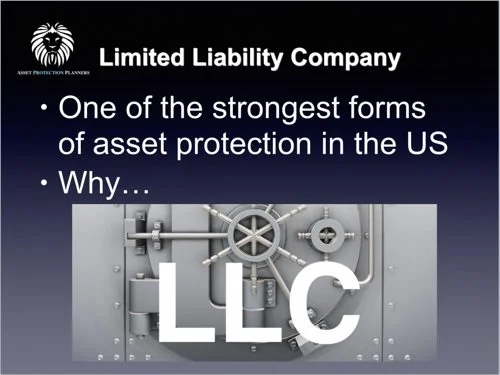Forming an LLC can protect you in ways that sole proprietorship, partnership or corporation cannot. Here are four of those ways.
- Protection from business liability. An LLC can keep your personal and professional assets distinct and separate. Suppose a creditor seeks money from an LLC. That same credit or does not automatically get to attach your personal assets in his or her lawsuit.
- Protection from the acts of other owners. A general partnership exposes all partners to liability against the business. When your partner causes liability, you are on the hook. An LLC, conversely, can shield you from the legal and/or financial repercussions of missteps that other LLC members take.
- Asset protection. Let’s say someone sues you personally. There are provisions in the law to prevent the seizure of assets you hold in an LLC. A family limited partnership (FLP) can as well. This is called charging order protection. However, unlike an LLC, lawsuits against the FLP can directly attack the general partner who controls the FLP. A corporation, sole proprietorship or general partnership does not typically offer this type of protection.
- Control. Forming a limited liability company instead of a corporation can prevent an unwanted individual, such as a judgement creditor, from taking over or participating in your business affairs.

While an LLC can be quite an effective asset protection instrument, it is by no means perfect. Legislation differs among states and even more so once you consider offshore locations. Be sure you are familiar with the LLC regulations in the jurisdiction where you choose to establish your company. A single-member LLC (SMLLC) may not provide you with as much protection as a multi-member LLC (MMLLC) in most states.

Best States for LLCs
The good news is that there are three states that do offer asset protection to single-member LLCs. That is, Wyoming, Nevada and Delaware. All things being equal, we like Wyoming best because of the low initial and annual filing fees. Fortunately, you can form a company in one state and foreign qualify it to operate in one or more other states. As a rule, laws of the state where you formed it governs the LLC. So, you may want to consider these states if limiting liability is a primary goal for you and your business.
Offshore LLCs
Do you want the best LLC money can buy? Outside of the United States, the Caribbean island of Nevis offers superior protection to any U.S. LLC. It is extremely difficult to get a charging order against an LLC. Even if someone does manage to get a charging order, it falls off after three years; as opposed to 20 years in the U.S. An asset protection strategy that includes an international LLC and offshore trust with offshore bank account is nearly impenetrable.

How and LLC Protects Your Personal Assets
As an LLC manager, you follow the rules. You pay your suppliers and workers on time. You submit all state documents and pay the fees required to keep your LLC in good legal standing. Your members pay their share of the taxes of the LLC like clockwork. The last thing you may expect is for someone to bring a lawsuit against your business. The truth is, it’s not only creditors who can sue you to get you to pay up. You may have a disgruntled ex-worker nursing a perceived grievance. Perhaps you have a dissatisfied customer. You may even have a passer-by who just happened to get injured on your business premises. Almost anyone is a possible plaintiff. There are over 15 million civil cases filed in America every year. It seems no matter what business you may be in, there’s a potential lawsuit lurking just around the corner.
A judgement creditor, someone who has won a lawsuit and is entitled to a payment, is limited to the assets that the LLC owns. If you’re financially savvy, you would have maintained just enough money in your LLC to keep it fiscally healthy. Then you pay the rest to your members. Or, if business is really doing well, you can transfer some of your other assets to a separate asset protection instrument.
What if assets in your LLC are not enough to satisfy your debt? That’s when an equally savvy creditor will try to go after your personal assets. The sad truth is some people intentionally sue an LLC with little to no assets. They do so in hopes of penetrating the LLC and gaining access to a member’s personal wealth. That is why it is so important to have an experienced professional organization establish your LLC. When you set up your LLC properly, these types of predatory lawsuits will likely not succeed. Your LLC will serve as a shield, denying you legal nemesis access to your personal assets. An LLC can provide an effective barrier between your personal assets and the assets of your business.

Protection from Actions of Other Members
A judgement against your LLC or an LLC member does not automatically open you up to a creditor’s claim. It can happen that a creditor wins a lawsuit against another LLC member. The creditor will likely obtain a charging order from a court. That order instructs the LLC to redirect any income that is due to the debtor-member and allot it instead to the creditor. But, unlike a corporation, in an LLC, this does not mean the creditor gets the debtor-member’s control or ownership rights.
The creditor has few to no options if the LLC manager decides to withhold distributions to the debtor-member while the charging order is in effect. At the same time, however, the LLC manager can continue to pay the debtor-member a salary. That is because a charging orders does not seize salaries, it seizes distributions. Moreover, the LLC manager can also continue to make third-party payments on behalf of the debtor-member if the operating agreement contains this provision.
The LLC manager is compelled by the charging order to give to the creditor any distributions (except a salary) that is supposed to go to the debtor-member, once the manager decides to issue a distribution. But the charging order cannot actually force the LLC manager to issue a distribution to the debtor-member. The creditor is not entitled to the debtor-member’s control or ownership rights. Thus, he or she cannot vote to change the LLC manager’s decision. At the same time, distributions to other LLC members can continue as usual. This is because a charging order only affects the distribution earmarked for the debtor-member.

LLC Versus Corporation Protection
It is a different story if you formed a corporation instead of an LLC and a creditor wins a judgement against a stockholder. With corporate stock, you may suddenly find yourself facing an unwanted individual (the judgement creditor) across a boardroom table. This is because it is possible for a creditor to obtain ownership of a debtor-stockholder’s stock. For all intents and purposes, they become part-owner of an incorporated entity. The creditor will be entitled to the debtor-stockholder’s share of the company profits and can participate as fully as he or she cares to in the management of the corporation. If by some chance, a creditor garners a majority of the corporate stocks, even just 51 percent, he or she can force the sale of the company’s assets to satisfy the debt of the debtor-stockholder.
Because of the way a corporation is structured, there is very little the other stockholders can do. It is difficult to prevent an aggressive creditor from exercising whatever decision-making power the debtor-stockholder initially held. An LLC, on the other hand, can shield its owners and members from the possibility of having to work with an unwelcome individual. This is precisely because, as stated above, a creditor can only be entitled to a debtor-member’s distributions from the LLC, if any, and not his or her controlling or ownership rights. This protection given to LLCs pretty much holds true across all states. More than anything, this protection perhaps provides the greatest peace of mind for LLC members. That is, simply being secure in the knowledge that a member’s actions or bad decisions will not force them into an uncomfortable situation, or worse, insolvency.
State Protection for an LLC
There are a few LLC laws that most, if not all, states follow. The protection against creditors taking over a member’s voting or ownership rights is one such regulation that is common to most states. All states permit personal creditors to obtain a charging order against the interest of a debtor-member in an LLC. In fact in a number of states, a charging order is the only remedy available to a creditor with a claim against an LLC member.
Other states allow creditors to petition a court to foreclose on a debtor-member’s interest. This usually happens when a charging order has been issued but the LLC has not paid a distribution to the debtor-member, making the charging order moot. When a foreclosure is granted by a court, the creditor becomes the permanent owner of the debtor-member’s interest in the LLC. Again, however, this refers only to the financial interest of the debtor-member in the LLC. In states that allow foreclosure, the creditor and LLC members often reach a compromise before enforcing the foreclosure. Thus, in states that allow foreclosure, creditors have a bit more of a bargaining chip than in states that do not allow this remedy. In a few states, creditors can obtain a court order that can lead to the dissolution of an LLC so its assets can be sold and used to pay off its debt.
There is no law that says you have to establish your LLC in the same state where you live or even where you conduct your business. As a rule, however, laws of the state where you formed it governs the LLC. So choose well. States like Delaware, Nevada and Wyoming have debtor-friendly legislation. Typically, a personal creditor going after an LLC’s assets will think twice before pressing with his or her lawsuit against an LLC established in a known debtor-friendly state.

Added Protection of a Multi-Member LLC
If you’re thinking of forming a single-member LLC, you may want to reconsider. Keep in mind that one of reasons a court limits personal creditors of LLC members to a charging order remedy is to protect the other members of the LLC. It would seem rather unfair to penalize one member for another member’s actions. But in an SMLLC, there are no other members to protect, and courts apply the law as it befits each individual case. In a number of states, it’s unclear what type of protection, if any, SMLLCs will receive in court. Forming an MMLLC instead removes this ambiguity and therefore, provides your LLC with the full protection of the law.
Recently, as stated above, a few states have added wording to their statutes granting asset protection to single member LLCs. As of this writing, those states are Nevada, Delaware and Wyoming. All things being equal, we prefer Wyoming because of the cost and speed of formation.
An LLC can protect your personal assets from being attached to a lawsuit brought against an LLC in which you are a member. The charging order remedy limits a creditor to the interests of the debtor-member and spares other members from any legal consequence arising from the debtor-member’s action. Additionally, the structure of an LLC ensures members that a charging order creditor cannot take over or participate in the business affairs of the LLC.
Although some aspects of LLC legislation are common to all 50 states, there are significant differences among states. Choose a state that provides you with the limited liability protection with which you are most comfortable. Finally, for an added layer of protection, consider setting up an MMLLC rather than an SMLLC. Although forming an LLC can be a powerful protection against a particularly aggressive claimant, it is but one step in minimizing your personal and professional liability and in protecting your assets. A comprehensive asset protection plan with both domestic and offshore components is your best defense against frivolous lawsuits and predatory creditor claims.



